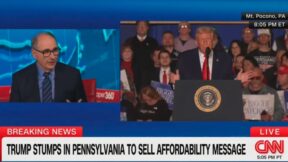Econ Professor Tells CNN Forgiving Student Debt Will Make Inflation ‘Worse’: They Should Make Payments ‘They Already Agreed To’
Federal budget expert and Johns Hopkins University economics professor Marc Goldwein told CNN’s Poppy Harlow on Tuesday that the plan under consideration by the White House to cancel some student loan debt would work to counteract the Inflation Reduction Act, hurt the economy, and actually “widen the racial wealth gap,” contrary to claims.
The Biden administration will be making an announcement regarding student loan debt on Wednesday, and are reportedly leaning toward cancellation of debt and extending the emergency “pause” on payments that’s set to expire at the end of the month.
Harlow spoke with Goldwein about his analysis of the plan, which argues that the plan being considered to extend the “pause” to the end of the year and to eliminate up to $10,000 in student debt for some borrowers would “wipe out” nearly every “inflationary gain” from the IRA.
Goldwein said that the administration’s plan to extend the pause would cancel out any gains, and would “do more to increase inflation from debt cancelation than any inflation reduction from from the Inflation Reduction Act.”
Harlow noted that, because of inflation, people who are already paying higher costs would be adding back a significant extra monthly payment if the pause is not extended. She asked, “And you’re saying that’s a that’s a burden the American people have to bear, given the other more negative effects in your analysis?”
“Yeah, that’s sort of the Catch-22 of this all,” Goldwein replied. “We can send everybody another round of checks to to pay for their inflation costs, but that would actually make inflation worse. What we need to do now is get inflation under control. One of the easiest ways to do that is to ask people to start paying back the debt they already owe, to start making the principal payments that they’re they already agreed to.”
He said that while not everyone who who has student debt “is rich” there is a disproportionate amount of student held by people with advanced degrees and higher incomes who can “bear” the extra cost.
POPPY HARLOW: The White House is weighing what to do about college loans as the current pause on most federal student loan payments is set to expire at the end of this month. Well, CNN’s new reporting overnight is that officials are leaning toward canceling up to $10,000 in debt for borrowers who make less than $125,000 a year. This decision could come as soon as tomorrow, we’re hearing. So let’s talk about it, the implications, what this would mean, with Marc Goldwein. He is a senior vice president and senior policy director for the nonpartisan Committee for a Responsible Federal Budget, also an econ professor at Johns Hopkins. It’s good to have you, Marc. Thanks very much.
MARC GOLDWEIN: Thanks for having me.
HARLOW: So I read through all your analysis and basically it shows that canceling this student loan debt for folks would undermine the inflationary work that the Inflation Reduction Act is set to do and what the administration wants it to do. Why? Why do they cancel each other out?
GOLDWEIN: Well, so the Inflation Reduction Act saves maybe $300 billion in its first ten years. If we do cancel $10,000 of debt and just extend the pause a few months, we’re going to be at about that much in terms of new costs. So all the deficit reduction has to be wiped out. At the same time, we’re probably going to do more to increase inflation from debt cancelation than any inflation reduction from from the Inflation Reduction Act.
HARLOW: Okay. So I want to get to the second point you made, and that is, you know, what is inflationary and what is disinflationary. So there there are a bunch of economists, I’d say, Mark Zandi at Moody’s, also former Labor Department economists, Heidi Shierholz, who say they think you’re wrong. Right, and let me talk about Shierholz, for example, who worked in the Obama administration. She says your analysis is, quote, ‘profoundly off-base.’ And the reason she says that if she points to the two-plus-year moratorium we’ve already had on student debt payment, and she says these folks have had this money in their pockets for two plus years. And so canceling the student loan debt would not effectively put more money in their pocket right now. How do you respond to that?
GOLDWEIN: Yeah. So what these folks are doing is they’re playing a baseline trick. They’re pretending that we’re going to extend this repayment pause forever. And it’s true, compared to extending the temporary emergency era repayment plus forever, just canceling debt and restarting payments would be disinflationary. But that’s not the right comparison. The right comparison is: compared to repayment starting in about a week as scheduled. This was always meant to be a temporary pause.
If it’s a permanent pause, it’s not student debt, it’s student grants.
HARLOW: So I think what is what complicates this picture, right, for the average viewer watching right now is that they’re dealing with inflation near a 40-year high. They’re dealing with much more expensive groceries. Gas has come down a bit, but it’s still more than what they’re used to, more expensive housing, transportation, clothing. I could go on and on. So I just wonder if you’re concerned at the possibility that restarting these payments, right, in a few days worsens that burden on Americans struggling with this inflation in this moment? That’s the reality, right?
GOLDWEIN: Yeah, that’s exactly what it’s going to do. It’s not as if this is going to lift inflation from 8% to 9%. What this is going to do is make it more difficult for us to get inflation down to two or 3%, which is where it really should be. It’s going to make the Fed’s job harder, and that means it’s going to increase the risk they’re going have to drive us into a recession to get inflation under control.
HARLOW: But it’s also going to mean another bill, significant monthly bill for some folks on top of their higher bills because of inflation right now. Right? And you’re saying that’s a that’s a burden the American people have to bear, given the other more negative effects in your analysis?
GOLDWEIN: Yeah, that’s sort of the Catch-22 of this all. We can send everybody another round of checks to to pay for their inflation costs, but that would actually make inflation worse. What we need to do now is get inflation under control. One of the easiest ways to do that is to ask people to start paying back the debt they already owe, to start making the principal payments that they’re they already agreed to.
And by the way, while not not everybody that has student debt is rich, disproportionately student debt is being held by people that have advanced degrees and good income. And they can bear it a lot more than everyday Americans that are seeing the cost of their gasoline and clothing go up.
HARLOW: Your your analysis points to wealthier households with like medical degrees or JDS, they’re attorneys. I think the cap at $125,000 a year would cut some of those folks out. Not all, but it will cut some of those folks out.
But one other thing that I thought was just interesting from what you guys looked at here is that you found that student loan cancelation would not significantly decrease the racial wealth gap. I’m wondering if you could speak to whether you think there is a more targeted approach than what we’re hearing is likely to come from the White House that would be more effective there.
GOLDWEIN: Absolutely. The issue is debt cancelation might reduce the racial racial wealth gap between two rich doctors, a rich black doctor and rich white doctor. But it actually widens the racial wealth gap overall because disproportionately people that hold student debt that went to college are white and disproportionately people. The 87% of Americans that didn’t go to college are disproportionately people of color.
So this would actually widen the racial wealth gap overall. A more targeted approach would focus on fixing income driven repayments and more importantly, and getting college affordability in the first place. That means pushing colleges to accept more AP credits and transfers from union colleges more no frills degrees. Get cutting out some of the administrative waste. That’s what we really need to do is make college affordable, not send a $10,000 gift to people that already have, in many cases, advanced degrees.
HARLOW: Marc Goldwein, I thank you so much. And of course, we welcome anyone on from the administration to join us and counter your points. We’ll see what happens this week. Thank you.
Watch the clip above via CNN.




